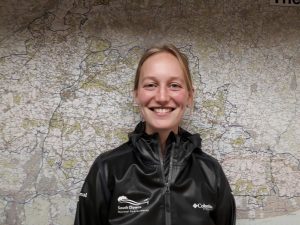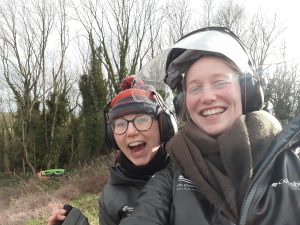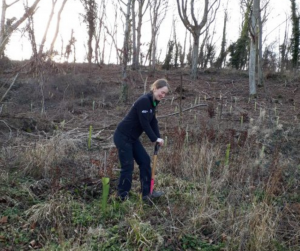Meet the former nurse who fell in love with nature and became a National Park ranger
March 8, 2022
For World Female Ranger Week (running 23 – 30 June), we chat to former nurse-turned-Assistant Ranger, Sophie Brown.
Sophie has been helping to deliver the Farming in Protected Landscapes initiative, which is supporting nature-friendly farming and sustainability in the countryside.
What led you to leave nursing to be a ranger?
 I really enjoyed being a nurse and loved working as part of a close-knit team.
I really enjoyed being a nurse and loved working as part of a close-knit team.
Shortly after qualifying I took up bird ringing reconnecting with my childhood love for birds.
I then realised that I loved ecology more than medicine and wanted to look for a career that took me outside, working to conserve wildlife.
Working as a ranger, I still have the pleasure of working as part of a close team and meeting lots of wonderful people working towards the same goal of improving the landscape for wildlife.
What does a National Park ranger do?
Rangers work with landowners on projects that improve habitat and biodiversity, or access to the countryside.
We often go out with volunteers to get practical tasks done.
In the summer there are ecological surveys to be done and lots of events to engage people with the countryside.
What is the job like day to day?
 Varied!
Varied!
Some days are out with the volunteers doing habitat management or doing bird and insect surveys.
Sometimes we go and meet landowners on site to offer advice and other days we are out doing public events, introducing the public to the National Park; how to access it and the wonderful wildlife they can see.
What do you love about your job?
Being outside and practical, working with lots of different people, variety throughout the seasons.
What advice would you give someone who wants to do what you do?
 Find local opportunities to volunteer and meet different organisations.
Find local opportunities to volunteer and meet different organisations.
Look out for apprenticeships and traineeships. Countryside Job Service is a good website to look for volunteering as well as paid positions.
There are also lots of courses available through the Fields Studies Council, People’s Trust for Endangered Species and the Wildlife Trusts.
Follow what you enjoy and learn as much as you can!
